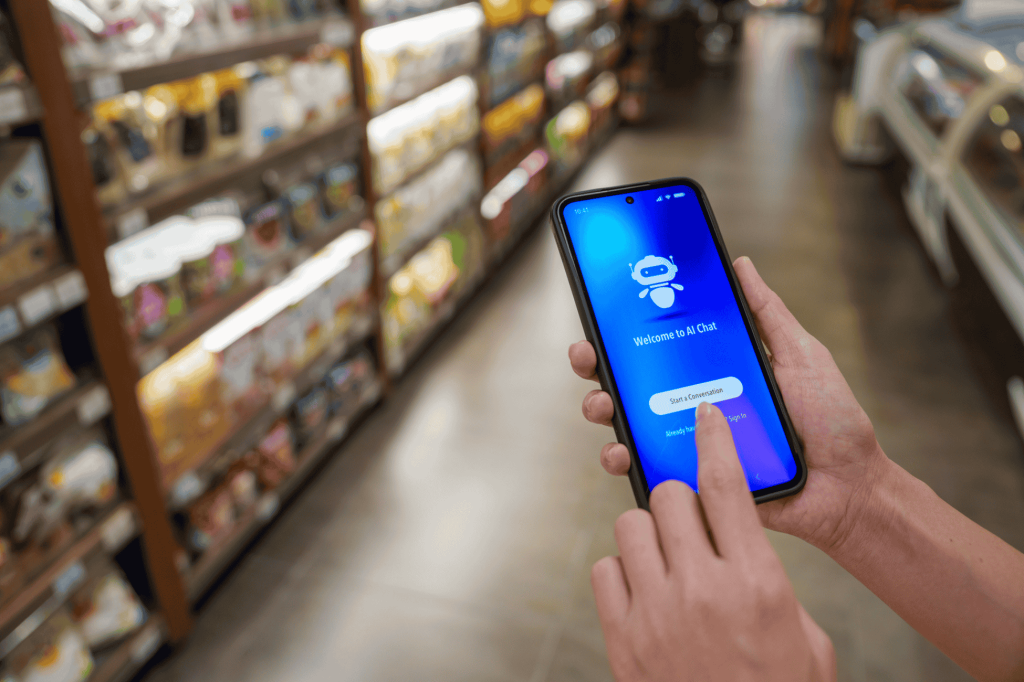
How can we help you?
AI in business: How companies are using artificial intelligence to scale smarter
Content
Introduction
In today’s hypercompetitive world, decisions can’t wait. Markets move fast. Customers expect more. Teams are stretched thin. This is why AI in business is no longer a futuristic option; it’s a present-day necessity.
Artificial intelligence (AI) refers to systems that can simulate human intelligence to solve problems, analyze data, or automate tasks. From ChatGPT apps to enterprise-grade AI platforms, the technology has gone mainstream—and is now transforming how businesses operate, serve customers, and innovate.
So, how does AI in business work? Why is it so important now? And how can companies—especially in sectors like retail and fast-moving consumer goods (FMCG)—including Packaging, Pet, Government, and Media & Advertising Technology (AdTech)—turn AI into a sustainable advantage?
Let’s break it down.
Benefits of AI in business
Streamlining business processes through AI
AI simplifies complexity. In FMCG, forecasting tools automate demand planning. In retail, dynamic pricing systems adjust prices in real-time based on shopper behavior and competitor trends. In the Packaging industry, AI helps optimize material usage and design iterations, reducing costs and time to market.
In the context of market share, businesses increasingly rely on AI to track competitive positioning across categories, geographies, and time periods.
Go deeper: Discover how AI can enhance business processes.
In Pet Care and Veterinary Supply, AI predicts stockouts and adjusts fulfillment. In Government, it helps automate citizen services and internal workflows. And in Media & AdTech, AI manages programmatic ad placement with precision and speed.
Enhancing efficiency and productivity
AI strengthens operational productivity by simplifying or streamlining time-consuming tasks. For example, CPG teams use AI marketing tools to auto-generate ad copy or optimize budget allocation. Retailers use AI-powered inventory systems to balance stock in real time. Governments can scan public feedback through natural language processing (NLP) and prioritize citizen needs quickly.
AI also enables faster product development, helping companies test concepts and adapt products in real time.
Retailers also use AI to support demand forecasting, improving replenishment strategies and product availability across stores.
Real-time decision-making with AI
With AI in business analytics, decisions no longer wait on monthly reports. Real-time dashboards powered by AI show what’s happening—right now. Retailers monitor in-store performance. CPG brands see regional sales spikes. Media & AdTech platforms adapt campaigns on the fly.
In many cases, businesses leverage market analysis tools powered by AI to interpret trends, identify anomalies, and adapt rapidly to shifting demand.
Big data analytics also play a role in enhancing category management, enabling retailers to optimize assortment and shelf space based on real-time shopper behavior.
Big data analytics: Do you trust your data inputs enough to stake the future of your business on the outputs they generate?
Automating repetitive tasks
AI automates what used to be manual:
- Marketing: Automated content creation, A/B testing, budget optimization
- Sales: Lead scoring, customer relationship management (CRM) data entry, sales forecasting
- Retail: Self-checkouts, restocking alerts, point of sale (POS) integration
- FMCG: Predictive replenishment, logistics routing
- Pet: Order fulfillment, digital prescription verification
- Government: Document processing, chatbot-based citizen queries
- Media & AdTech: Programmatic ad buying, sentiment monitoring
Improving customer service and satisfaction
AI-powered chatbots, voice assistants, and personalized portals are revolutionizing support. Customers get faster, smarter answers. Meanwhile, support teams are freed up to focus on complex cases.
Go deeper: See how AI can enhance the customer experience.
In retail and FMCG, AI anticipates customer needs. In Government, it shortens support queues. In Media, it personalizes recommendations and content flow.
Many organizations enhance customer focus through consumer insights, enabling better product alignment and messaging.
AI-powered business analytics
AI uncovers patterns across massive datasets, identifying trends, anomalies, and opportunities. In FMCG and Packaging, predictive analytics pinpoint rising demand before it peaks. Retailers can see category-level performance by region. In Pet, AI helps detect shifts in buyer preferences.
In Government, AI analyzes public data for better policy decisions. In Media, it suggests the most effective content formats or ad channels.
AI technologies in business
Computer vision and its applications
Computer vision allows machines to “see,” enabling use cases like automated shelf monitoring in retail, defect detection in packaging, or facial analysis in user authentication systems.
Deep learning and its role in AI
Deep learning uses neural networks to spot intricate patterns in data, like predicting supply chain delays in FMCG or customer churn in e-commerce. It powers recommendation engines and image recognition in media.
Cognitive technology and its impact on business
Cognitive tech blends AI with behavioral understanding. It enables virtual assistants, smarter CRM tools, and emotion-aware interactions—crucial for industries aiming to deepen customer relationships.
Machine learning (ML) for data analysis
ML automates analysis, flagging what humans might miss. Retailers use it to track micro trends. Pet brands use it for behavioral analysis. Governments apply it in smart cities. Media companies use it to optimize campaign performance.
Facial recognition for security and personalization
In packaging plants, facial recognition controls access. In retail, it tailors signage to demographics. In government buildings, it tightens entry security. In media, it adjusts content recommendations.
Natural language processing (NLP) for customer interactions
NLP powers smarter search, chat, and feedback tools. In FMCG, it’s used for analyzing social sentiment. In government, it supports multilingual citizen services. In media, it enhances automated transcription.
Use cases of AI in business
CRM
AI-enhanced CRMs prioritize leads, suggest best actions, and personalize engagement—vital for FMCG, retail, and media, where timing is everything.
Product recommendations and personalization
AI uses behavioral and contextual data to suggest the right product at the right time. FMCG and pet retailers see basket size grow. Packaging brands highlight eco-products. Government agencies recommend services.
Automating business processes
From invoicing to onboarding, AI reduces friction. FMCG and packaging brands save hours weekly. Retailers simplify promotions. Media companies automate content tagging and compliance.
Human resource management
AI matches job candidates to company needs, predicts attrition, and offers unbiased screening. FMCG and government sectors especially benefit from optimizing workforce planning.
Self-driving cars and transportation
AI enhances logistics—route optimization, fleet management, and predictive maintenance. In FMCG, it ensures faster last-mile delivery. In government, it improves urban transport systems.
Go deeper: Many firms transform campaign planning and execution using AI-driven marketing strategy tools, aligning message, channel, and timing for maximum impact.
Challenges and considerations
Ethical considerations
Bias in data, fairness, and transparency must be actively managed
Data privacy and security
Safeguarding consumer and proprietary data is critical
Workforce impact
Automation can augment jobs but may also displace roles, requiring reskilling
Adoption barriers
Many organizations lack internal readiness or data infrastructure to scale AI effectively
Future trends and opportunities
Generative AI in business
Tools that create images, content, or simulations are redefining creativity and R&D
AI-powered social media marketing
Hyper-personalized campaigns are now feasible with ML-powered targeting
Big data and AI
Combining big data with AI reveals hidden business opportunities across sectors
Best practices for AI adoption
Start with data quality, establish clear use cases, and partner with AI-savvy firms like NIQ
Innovation and competitiveness
Companies adopting AI strategically are more agile, responsive, and customer centric
Conclusion: How NIQ can help
Artificial intelligence in business isn’t optional anymore; it’s essential. From smarter decisions to scalable personalization and automated workflows, AI is a business multiplier.
NIQ helps organizations do more than access AI; it helps them succeed with it, through platforms such as:
gfknewron Predict– Empower your decision making process and drive growth- gfknewron Consumer – Analyze the who & why of consumers in a digital platform
- gfknewron Market – Analyze what products are sold where and at what price
- BASES Optimizer – AI technology explores your next innovation’s opportunity areas
- Revenue Optimizer – Develop the best price and promotion strategy
With insights from innovation hubs like NIQ Labs, businesses can turn data into strategy—and AI into real-world outcomes.
Start transforming today. Make AI in business a reality—with NIQ.


